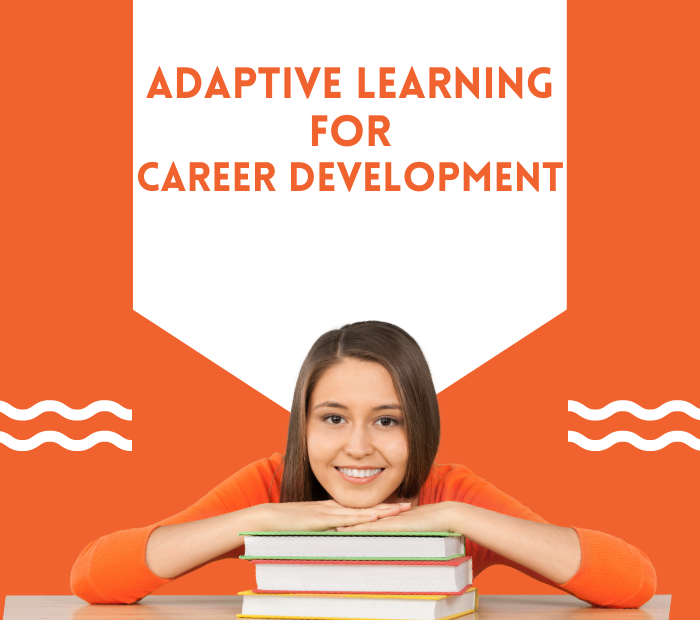Adaptive learning for career development promotes active engagement and motivation. Adaptive learning holds great potential for career development by providing personalized, engaging, and flexible learning experiences. The current traditional method of career coaching and employee training is, in many ways, outdated and unsatisfactory. It places too little emphasis on one-on-one coaching and, as a result, can be inadequate when it comes to teaching many employees. More recently, however, we’ve seen the rise of a new AI and algorithm-based teaching methodology called Adaptive Learning. This undervalued technology offers cost-effective and more personalized career coaching services as well as general teaching benefits. Adapting learning comes with many benefits that can substantially improve efficiency in an organization while ensuring competency from workers. Let’s look at why adaptive learning is imperative for career development.
What is Adaptive Learning?
Adaptive learning is concerned with personalizing and optimizing e-learning for the needs of the individual. Most learning institutions online and in the workplace don’t do enough to help each person in specific ways resulting in an incomplete learning experience, like a teacher in a traditional school would give a student some extra private teaching to focus on their weaknesses. Adaptive learning in career training promises to teach by tailoring itself around the educational needs of the worker, focusing on areas in which the worker’s performance is unsatisfactory while avoiding investing time into the worker’s strong suits. Adaptive learning embraces the adage “One size does not fit all” and disregards more traditional teaching traditions in favor of more valuable and efficient services.
Read More: Career Development In Mass Communication
Time Efficiency
Using Adaptive Learning for employee training saves a lot of time. It increases efficiency considerably by allowing the learners to skip through the part of the learning content they feel they are already adept at. Through Adaptive Learning, they can divide their time spent learning as needed instead of forcing themselves to sit through hours of content they don’t need to waste time on. As a bonus, any time saved during learning is more time invested into their primary job, leading to more long-term productivity.
Identifying Weaknesses
A central part of Adaptive Learning is the focus on identifying and dealing with the specific weaknesses of all learners. This allows for patching any holes in the employees’ proficiency that they might not even be aware of themselves, leading to better work performed and an overall benefit for the company. This can help employees form more complete skill sets and work to the best of their ability.
Diversity in Teaching
As the number of people working abroad, either from home or traditionally, increases, the amount of diversity in the employees working will also increase. This results in difficulties in making an e-learning system that will suit every employee’s individual needs. Still, these difficulties can be mitigated entirely by implementing Adaptive Learning. For example, a person living in China doing remote work for an Australian company might require some dedicated work for their language skills, which the Adaptive Learning system can help them with.
Engagement
Adaptive learning allows for a more customizable and personalized learning experience. It results in more engagement from the learners as they aren’t bored or frustrated like they might have been if they were forced to waste time in lessons that don’t offer them enough benefits. This also helps make the employees feel more motivated to learn. This type of learning system also encourages many positive traits, such as taking ownership of your learning process, better self-management, and self-efficacy.
Relevant Learning Data
The higher-ups at the facilities undergoing a learning phase can access the data produced by Adaptive Learning to better gauge and understand the weaknesses and strengths of their employees as a whole and make efforts to correct them or work around them. This also allows the administrations to be more intimately involved with their employees’ skills and deficiencies.
Better Skill Average
With the use of Adaptive Learning, a better and more stable average in productivity is guaranteed. Without any gaping holes in any of the employee’s skill sets, their work performance is bound to increase. Adaptive learning also ensures that employees are able to catch up in their learning, which can be substantially beneficial.
Bottom Line
Adaptive Learning matters for career development due to the vast amount of advantageous and favorable qualities it brings to the teaching environment in workplaces. The benefits it presents for both the individual employee as well as the workplace as a whole cannot be understated. As Adaptive Learning gains popularity and users, the technology will grow and provide even more advantages over the traditional learning system.
We hope this article proved insightful to you.

